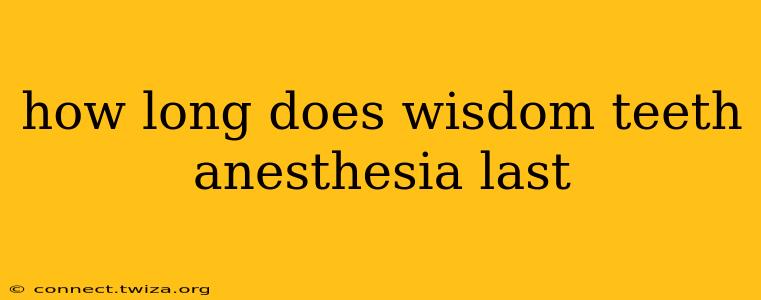How Long Does Wisdom Teeth Anesthesia Last? Understanding Your Post-Surgery Experience
Having your wisdom teeth removed is a significant oral surgery, and understanding the duration and effects of the anesthesia is crucial for a smooth recovery. The length of time wisdom teeth anesthesia lasts varies depending on several factors, and knowing what to expect can ease anxiety and ensure a safe post-operative period.
What type of anesthesia is used for wisdom teeth removal?
This is often the first question patients have. There are generally two types of anesthesia used:
- Local Anesthesia: This numbs only the area around the wisdom teeth, allowing you to remain awake during the procedure. The effects are localized and wear off relatively quickly.
- General Anesthesia: This puts you completely to sleep during the surgery. It's a more profound form of anesthesia, and recovery time varies. Sometimes, a combination of local and general anesthesia is employed.
How long does local anesthesia last?
The effects of local anesthesia typically wear off within a few hours after your wisdom teeth extraction. However, the precise duration depends on the type and amount of anesthetic used, as well as your individual metabolism. You might experience some lingering numbness for several more hours, or even a day or two after the procedure, but the sharp, complete numbness should disappear within that initial few hours.
How long does general anesthesia last?
The duration of general anesthesia is significantly longer and depends on various factors including the complexity of the surgery, your overall health, and the anesthesiologist's judgment. You'll be asleep during the procedure and may experience a period of drowsiness and disorientation upon waking. The effects of general anesthesia usually wear off within several hours, but it's not unusual to feel sluggish and fatigued for the remainder of the day. You'll likely need someone to drive you home.
What factors influence the duration of anesthesia?
Several factors can influence how long your anesthesia lasts:
- Type and Amount of Anesthetic: The specific anesthetic used and the dosage administered directly impact the duration of its effects.
- Individual Metabolism: Your body's metabolism plays a role in how quickly your body processes and eliminates the anesthetic. Faster metabolism may lead to shorter anesthetic effects.
- Complexity of the Procedure: More complex extractions may require a higher dosage or longer duration of anesthesia.
- Patient's Health: Pre-existing health conditions might influence anesthetic response and recovery time.
What should I expect after the anesthesia wears off?
Once the anesthesia wears off, you can anticipate several post-operative effects:
- Pain: Expect some level of pain and discomfort at the extraction sites. Your oral surgeon will prescribe pain medication to manage this.
- Swelling: Swelling is common and usually peaks within 2-3 days.
- Bleeding: Some minor bleeding is expected, but excessive bleeding should be reported immediately to your surgeon.
- Bruising: Bruising is possible, especially with more complex extractions.
How long will I feel numb after wisdom teeth removal?
As mentioned, this depends on the type of anesthesia used. You might experience some numbness for several hours or even a few days after the local anesthesia wears off. This is not unusual and is typically a sign of successful nerve blocking during the procedure. If you are concerned, always contact your oral surgeon or dentist.
When can I drive after wisdom teeth removal?
This is crucial, and it depends on the type of anesthesia. If you had general anesthesia, you absolutely cannot drive yourself home. You'll need someone to drive you. Even after local anesthesia, it's important to wait until the numbness has completely worn off and you feel alert enough to drive safely before operating a vehicle. This is to ensure your safety and that of others.
Disclaimer: This information is for general knowledge and does not constitute medical advice. Always consult your oral surgeon or dentist for personalized guidance regarding your specific situation and recovery. They can provide detailed information tailored to your individual needs.
